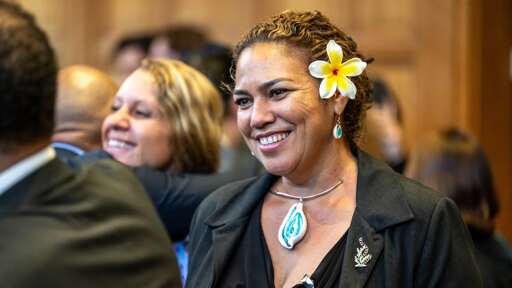In January 2004, Cyclone Heta pummeled the shores of the island nation of Niue, uprooting trees and flooding homes with 184 mile-per-hour winds and 164-foot waves. As dawn approached, after an intense night, the winds died down, and Coral Pasisi began to worry about her neighbors. The storm had been more violent than she’d expected — a tree had fallen on her roof, and the water was up to her ankles. It was 4 in the morning when she began her drive to check on her community.
Normally, when Pasisi drove down the hill of the western shore of the island, she saw the national museum with its familiar outdoor amphitheater where she’d watched so many traditional dance performances. But instead, there was a clear view of the ocean. The museum was gone.
“There was nothing left,” Pasisi said. “It looked like a war zone.”
Gone, also, were the island’s only hospital, its courthouse, and its fuel depot. Two people on the island died during the storm, then home to just over 1,700 residents, and damage was estimated to be nearly 48 million U.S. dollars — five times the nation’s annual gross domestic product. Two decades after the storm, the memory of the missing museum still brings her to tears.
“This is an unimaginable and irreparable and irreplaceable non-economic loss. One that cannot be remedied or restored,” Pasisi told the International Court of Justice, or ICJ, at The Hague in December 2024. “One that has robbed our children of their future inherent rights of traditional knowledge and cultural identity.”
Pasisi’s testimony was among more than 100 that would help propel the ICJ to issue a landmark advisory opinion that every nation on earth has a legal obligation to limit greenhouse gas emissions. Now, Pasisi is among many Indigenous Pacific advocates who are traveling to Brazil to attend COP30 — the annual intergovernmental gathering of U.N. member states — to try to ensure that world leaders adhere to that ruling.
“This is a different lens of clarity that we all have now going into COP30,” said Pasisi, who is now a director of climate change and sustainability at The Pacific Community (SPC), a New Caledonia-based international development organization made up of Pacific nations and territories as well as global partners like the U.S. No longer are she and her fellow Pasifika advocates simply arguing that leaders have an ethical responsibility to save the planet, she said. “There’s nothing like a legal opinion to show what side of the law you need to be on.”
Pacific advocates at COP30 are demanding global leaders follow the ICJ’s ruling by phasing out fossil fuels and funding climate disaster recovery projects. Many are also calling for Indigenous peoples and traditional ecological knowledge to be included in climate decision-making and are pushing back on efforts to sacrifice Pacific seabeds for lucrative transition mineral mining operations. They argue the next COP should be held in Australia, where they hope to better convey how climate change is impacting their lands and waters.
But while the ICJ ruling clarifies international law, it is a non-binding advisory opinion and nations can flout its directives. A failure to adhere to that ruling, however, would undermine the court and the global system of international law while further exacerbating the climate crisis. Considering that the ICJ case was originally brought by law students at the University of the South Pacific in Vanuatu, that makes this COP one of the most important in the event’s last 30 years for advocates from the Pacific.
“Our homes, cultures, and ways of life are at the front lines of a crisis we did not cause,” said Belyndar Rikimani, of the Solomon Islands and one of the founders of the Vanuatu student group that pushed for the successful ICJ climate ruling. “Our goal is to remind negotiators that behind every policy decision are real people and real lives at risk.”
Sindra Sharma, international policy lead at the Pacific Islands Climate Action Network, wants COP30 negotiations to result in country participants being required to revise their national emissions targets to ensure that the world won’t exceed 1.5 degrees Celsius of warming. “We’re going into this COP now for the first time ever in the history of COPs armed with what (the ICJ) gave us, which is a tool of hope and ambition,” she said. “We’re going to really use that tool to make sure that we can come out of this with the justice that is necessary for people and the rest of the ecosystems.”
Better accountability is essential, agreed Pasisi, as well as more money to both prepare for climate impacts and recover from the aftermath. When Niue sought help from global climate finance organizations to help rebuild in the aftermath of the 2004 cyclone, its leaders were told that rebuilding their infrastructure did not meet the grant criteria. The community would’ve qualified if it was relocating before the storm hit. Disaster response, they learned, did not qualify as climate adaptation.
Through her current job, Pasisi now provides technical assistance to Pacific communities who are trying to get grants from global funders like the Green Climate Fund and Adaptation Fund. But she said it frequently takes eight years for the money to arrive, and local programs need faster funding.
Money and ambitious climate goals are important, but a delegation of Māori youth from New Zealand Aotearoa are also calling for Indigenous decision-making power in climate governance. Unlike many other Pacific island nations, like Niue, the Māori of Aotearoa did not achieve self-determination through the U.N. process and don’t have a seat at the table at the U.N.
“We will not accept climate ‘solutions’ that repeat systems of extraction and inequity. Climate action must center Indigenous rights, honor Te Tiriti o Waitangi, and recognize the personhood of te taiao,” they said in a statement referring to a treaty between Māori chiefs and New Zealand’s first settlers, and using Māori term for the natural world.
Earlier this year, a mountain known as Taranaki Maunga was granted legal personhood in Aotearoa, a legal status that is intended to further conservation and traditional uses of the area that’s considered an ancestor to the Māori people. Aotearoa has also granted legal personhood to a forest and a river, part of a growing movement to recognize the rights of nature that’s also rooted in Indigenous values.
By now, Pasisi has attended more COPs than she can remember, and knows that even when political leaders make big promises, the next administration can easily renege on them. “It definitely is soul-destroying for lots of people who have been in the process for so long,” she said.
But this year, the biggest aspect that gives her hope is not anything that world leaders have said, nor even the text of the ICJ ruling — it’s the enthusiasm and dedication of Pacific youth like Rikimani. “I think when you see young people step up and say, ʻActually, this is my future, that we’re not going to drown, we’re actually going to survive and thrive. There isn’t an option to fail’ — that kind of commitment from our young people and voices is really powerful and encouraging,” Pasisi said.
“The fact that they led the ICJ call just shows you how powerful young people can be if you give them the space, and you support them in that process.”
This story was originally published by Grist with the headline The Pacific won a landmark climate case at the world’s top court. Now they want countries to act. on Nov 11, 2025.
From Grist via this RSS feed


